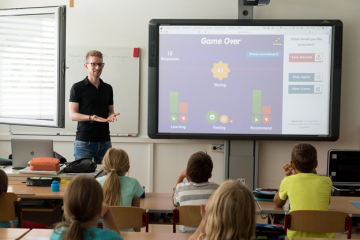 My Kindergartner came home a while back and matter-of-factly told me that she got kicked out of “the Katie club.” There are two other girls named Katie in her class, and they did what kids do—used what they had in common to create an exclusive club. Well, apparently changing your name isn’t the only thing that can get you booted from this particular club. You see, we live in Alabama, football capital of the world where even little girls talk about the game. On this particular day, the “Katies” allowed their fan allegiance to get in the way of their friendship, and the two War Eagles took a stand against my little Alabama fan.
My Kindergartner came home a while back and matter-of-factly told me that she got kicked out of “the Katie club.” There are two other girls named Katie in her class, and they did what kids do—used what they had in common to create an exclusive club. Well, apparently changing your name isn’t the only thing that can get you booted from this particular club. You see, we live in Alabama, football capital of the world where even little girls talk about the game. On this particular day, the “Katies” allowed their fan allegiance to get in the way of their friendship, and the two War Eagles took a stand against my little Alabama fan.
I wasn’t there, so I’m not sure how she reacted in the moment, but at home, she seemed more confused than upset. She simply didn’t understand why her supposed friends would ostracize her. I did the only thing I knew to do. I empathized with her, telling her I knew what it felt like to be treated unfairly. Of course, both the mother and the Alabama fan in me wanted to tell those girls a thing or two, but knowing it wouldn’t be dignified to get into a spat with 2 six year-olds, I suppressed the urge.
I’m sure there will be many more times when Katie feels rejected at school. Sometimes we get so caught up in how our kids are doing academically that we don’t consider their social development. It’s important to keep tabs on how your little one is getting along with the kids in her class and encourage healthy social development. So as your child interacts with others this summer, and for a fresh start for next school year, consider the following tips for doing just that.
Talk to Your Child
When your little one comes home from school (or a play date), don’t just ask her what she learned or did; ask her about her friends as well. Then, listen and observe her response. Do her eyes light up while she’s telling you about the game she played at recess or does she give you a blank stare? Cues like these can give you insight into how well your child is getting along with others.
Model Social Skills
If you’re concerned that your child is having trouble making friends, it may be time to intervene. Show her how to approach a new playmate at school or a friend’s house by saying things like “My name is Mallory. What’s yours?” ,“Do you want to play _________?, or “Can I play this game with you?” Then, role play with your little one until she becomes comfortable with these phrases. Tell her that it’s ok if she feels nervous at first, and let her know that there are likely other kids her age that feel the same way.
Approach the Teacher or Caregiver
If the problem persists, then it may be a good idea to approach the teacher or caregiver with your concern. She may be able to give you some insight into exactly what’s going on in the classroom or back yard, and even offer you some resources for helping your child progress socially. Plus, once the teacher is aware of what’s going on, she can keep an eye out for your child in class by making sure the other kids aren’t excluding her or giving her a nudge when it’s playtime.
Want to learn more? Check out this article from Psychology Today on how children make friends.
Do you have other ideas for encouraging kids’ social development? Share them in the comments section.


